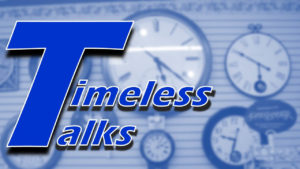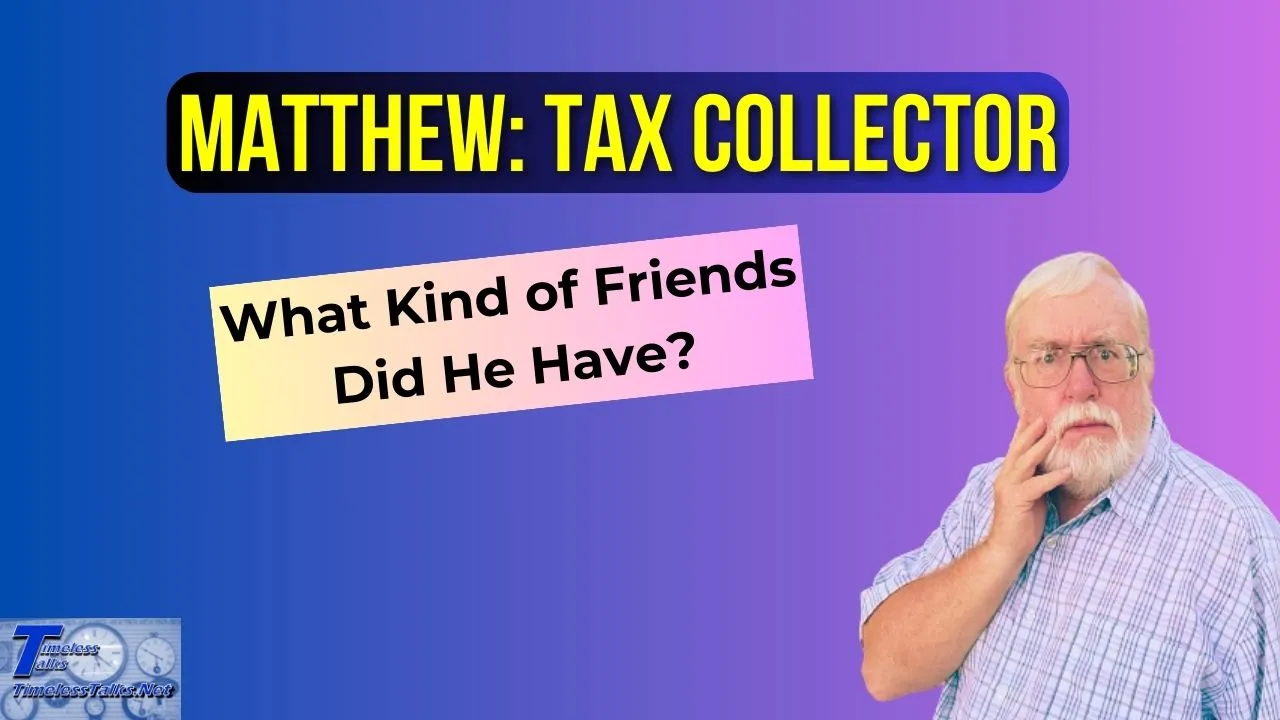"Matthew: Tax Collector
What Kind of Friends Did He Have?" Transcript
Transcript Written by Tim Estes
You can:
- DOWNLOAD offline on your computer/tablet/phone as a PDF file and read it anytime, OR
- Use the CONTACT LINK above (under Services) to request your collection be sent to you via USPS. This will REQUIRE you to include your mailing address (U.S. only).
Matthew: Tax Collector
What Kind of Friends Did He Have?
I don’t know of anyone who has a perfect life or perfect friends. Many struggle with being on the outside, feeling rejected or hated. Because of their bad choices they are being cut off. Well, there are answers and they are seen around the story of Matthew the tax collector and his feast.
INTRO
News about the now-famous traveling preacher & healer, Jesus, was common. He was popular and people by the hundreds went to great lengths to be healed from a terrible disease, or to listen to his non-traditional teachings that seemed upside-down.
A tax collector named Levi, also known as Matthew, would easily have been quite aware of who Jesus was and what he was doing.
One day Jesus observed Levi doing his job at the tax booth. (Luke 5:27-32) People were coming to him and paying their taxes. But Matthew himself was hated, as all tax collectors were hated by the Jewish people. It was as though these Jews had turned into “traitors” to their own nation & people by collecting taxes for the Romans. There is a good video linked below about Traitors. Watch it.
But Jesus did not hate Matthew. Jesus knew there was something important and worthy in Matthew. Matthew was asked to follow Jesus, to be one of the “special” followers.
Matthew did not delay in making a complete change. He quit his job as fast as he could. No hesitation. No delays.
Matthew celebrated with a great feast in his house. The Bible uses the word “megas”, to describe HOW BIG a party he was throwing.
The Bible says, (Luke 5:29) “And Levi made him a GREAT feast in his house, and there was a LARGE company of tax collectors and others reclining at the table with them.”
Who would Matthew invite? He himself was someone who was hated. Who wants to be with a traitor? He was excluded for other social events. His sense of “belonging” was the same as others who also had be rejected, who had so little hope of improvement. Only those without value would come near Matthew.
And wouldn’t you know it. Those self-righteous religious leaders of his community came and complained to the disciples of Jesus. They said, (Luke 5:30) “Why do you eat and drink with tax collectors and SINNERS?” You can just hear the disgust in their tone. In their minds, if you were religious you wouldn’t associate with anyone so revolting.
And that kind of thinking can be devasting to anyone who wants something better. It is a put-down. It is rejection. It is merciless. It spreads hopelessness.
Tax collectors are not so dreaded anymore, at least if you are not too far behind in your payments. They are only doing a job that God has indirectly authorized.
But what about sinners? God, not man, identified many lifestyles that HE condemns. Generally, these sins are also destructive to the people. There are numerous lists of God-condemned actions. Like….
Romans 1:26-32 For this reason God gave them up to dishonorable passions. For their women exchanged natural relations for those that are contrary to nature; (27) and the men likewise gave up natural relations with women and were consumed with passion for one another, men committing shameless acts with men and receiving in themselves the due penalty for their error. (28) And since they did not see fit to acknowledge God, God gave them up to a debased mind to do what ought not to be done. (29) They were filled with all manner of unrighteousness, evil, covetousness, malice. They are full of envy, murder, strife, deceit, maliciousness. They are gossips, (30) slanderers, haters of God, insolent, haughty, boastful, inventors of evil, disobedient to parents, (31) foolish, faithless, heartless, ruthless. (32) Though they know God’s righteous decree that those who practice such things deserve to die, they not only do them but give approval to those who practice them.
The old apostle, John, said this, (Rev 21:8) “But as for the cowardly, the faithless, the detestable, as for murderers, the sexually immoral, sorcerers, idolaters, and all liars, their portion will be in the lake that burns with fire and sulfur, which is the second death.”
But there is something to be said for each person involved in a sinful, continuous practice. They know how to gather themselves and form their own community. They gain an identity within this group. Think. People who practice homosexuality establish meeting places, and places to congregate. People practicing the Bible word “sorcery”, that is using mind-altering drugs, find places to meet. And what about people who drink alcohol? They meet at the bar.
Many years ago, there was a very popular comedy show named “Cheers”. Do you remember the theme song? The lyrics to the chorus are quite noteworthy.
“Sometimes you want to go
Where everybody knows your name,
And they’re always glad you came;
You want to be where you can see,
Our troubles are all the same;
You want to be where everybody knows your name.”
This just illustrates the situation of Matthew. All the people he knew were society’s rejects. But among themselves, there was inclusion, acceptance, and identity, even though sin is not pleasing to God.
But this is where the story of Matthew takes a major turn. It is here that Jesus began to offer hope to this very group of sinners.
Jesus responded to the Pharisees. He was not ugly to them or even insulting. But he did say, “Those who are well have no need of a physician, but those who are sick. (32) I have not come to call the righteous but sinners to repentance.”
Jesus was defining part of his mission, his work. It was not to “fix” those individuals who were actually righteous. The ones who make the correct offerings at the temple at the designated times. Those, who through faith, worked hard to live consistent lives with God in mind.
Jesus said he came to give those who are broken, hopeless, and without purpose an opportunity to change. That is what he wants from everyone. He wants us all to change our lifestyle and move it into a wholesome relationship with himself and his father.
He wants sinners to be included in God’s special people. He wants to give them a fresh sense of belonging to something good and holy. He wants them to have a special identity with him, to be His followers. He established HIS church, a community of imperfect people, wounded people, that encourage and strengthen each other with God’s principles. He wants them to experience HIS total forgiveness of all sins, and to embody the transformation he alone is capable of completing.
Do you feel like a social reject, unacceptable? Do you see the sins you can’t seem to quit? Do you want a new identity? Would you like a fresh start? How does forgiveness sound? Or belonging to a unique community?
Each of us associated with Timeless Talks wants you to know that we are not perfect. We make mistakes. But we also immediately change as soon as possible. And we are here to help you, no matter who you are or what problem you have. Send a text to the number on the screen. You can also call and leave a voice message. If you would like to find one of those places where you could begin all over again, use the phone number, or the contact page. We will help you find a good Biblical church home.
Thanks for watching. We love you and pray for you. Until we can visit again, goodbye for now.

